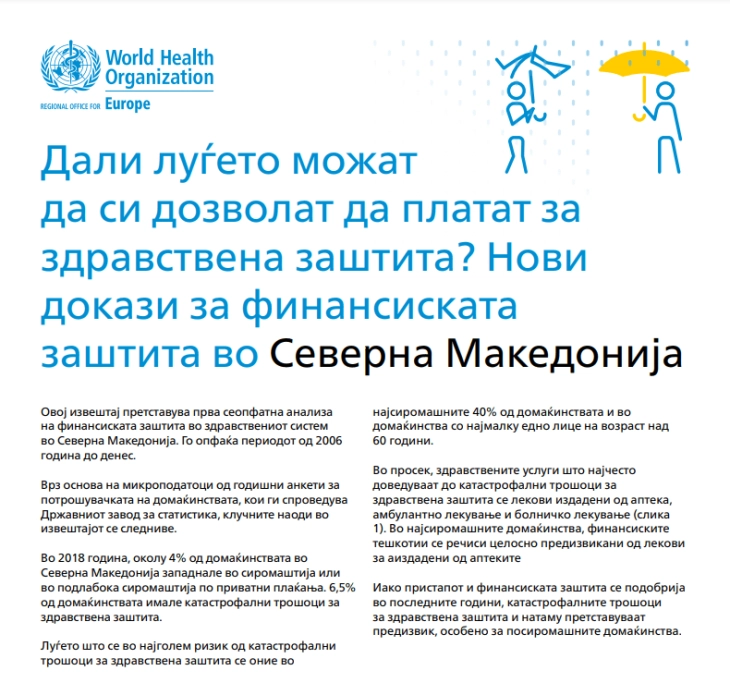WHO publishes report on financial protection in North Macedonia’s health system

Skopje, 25 November 2021 (MIA) - Although access and financial protection have improved in North Macedonia in recent years, catastrophic health spending remains a problem, according to a report published by WHO/Europe on Thursday.
The report entitled “Can people afford to pay for health care? New evidence on financial protection in North Macedonia” assesses the extent to which people in North Macedonia experience financial hardship when they use health services. It is part of a series of country-based studies generating new evidence on financial protection in health systems in Europe.
“For the first time, we can summarize North Macedonia’s progress in regard to financial protection by using comprehensive data,” WHO Regional Director for Europe Hans Kluge told the event.
Enhanced primary care, shorter wait times and increased health insurance coverage, he added, have improved financial protection in the country. Now, he noted, it’s time to go beyond this achievement and ensure universal health care.
“In the past few years, the European Commission stressed the need for investing in health equipment and capacities in North Macedonia, as one of the measures for curbing the drain of medical staff from the national health system. This report confirms this assessment and provides insight into the funding of health services in the country. North Macedonia must develop organizational and management structures, as well as key functions and skills, to ensure efficient planning and management within the public healthcare system. Measures for removing health inequality by strengthening the national health insurance system are needed. EU’s support for drafting the 2021-2030 health strategy will contribute to better health for all,” said EU Ambassador to North Macedonia David Geer.
According to the report, 6.5% of households experienced catastrophic out-of-pocket payments in 2018. Catastrophic health spending is heavily concentrated among the poorest households (in the two lowest consumption quintiles) and households with at least one member aged over 60 years and is largely driven by out-of-pocket payments for outpatient medicines.
“It’s good to see that access and financial protection was improving before the pandemic. Nevertheless, this report shows that North Macedonia has to step up efforts in order to establish a better system than the pre-pandemic one,” WHO Representative to North Macedonia Jihane Tawilah underlined.
People experience financial hardship when out-of-pocket payments – formal and informal payments reflect gaps in health protection coverage – a portion of the population is uninsured, medicines coverage is limited and protection against co-payments is weak. Moreover, public spending on health is low relative to gross domestic product (GDP).
“To improve access and financial protection, the health system should: de-link entitlement from payment of contributions for the whole population, so that access to health care no longer depends on health insurance status; improve the affordability of outpatient prescribed medicines by enhancing the selection and purchasing of medicines and regularly updating the positive list; simplify the complex design of user charges and strengthen protection against co-payments for outpatient medicines and address informal payments, starting with better monitoring,” reads the report.
These changes should be backed by increased public investment in the health system and careful use of new resources in order to fulfil the goals of justness and efficiency.
“The report was published at the right moment, just as we’re facing the need for rapid response over the COVID-19 pandemic and a transition to more sustainable, resilient and inclusive healthcare system. The Ministry of Health pledges to implement recommendations, in order to reduce the financial difficulties citizens face when using health services, as the country progresses towards universal health care and improves the pre-pandemic system,” said Health Minister Venko Filipche.
This study is part of a series of country reports generating new evidence on financial protection in health systems in Europe. The report on North Macedonia is partly funded by the European Commission’s Directorate-General for Neighbourhood and Enlargement Negotiations (DG NEAR), as part of the project on strengthening the resilience of health systems in Western Balkans.
The three-year project is set to mitigate the effects of COVID-19 in the region and support it moving towards universal health care.







